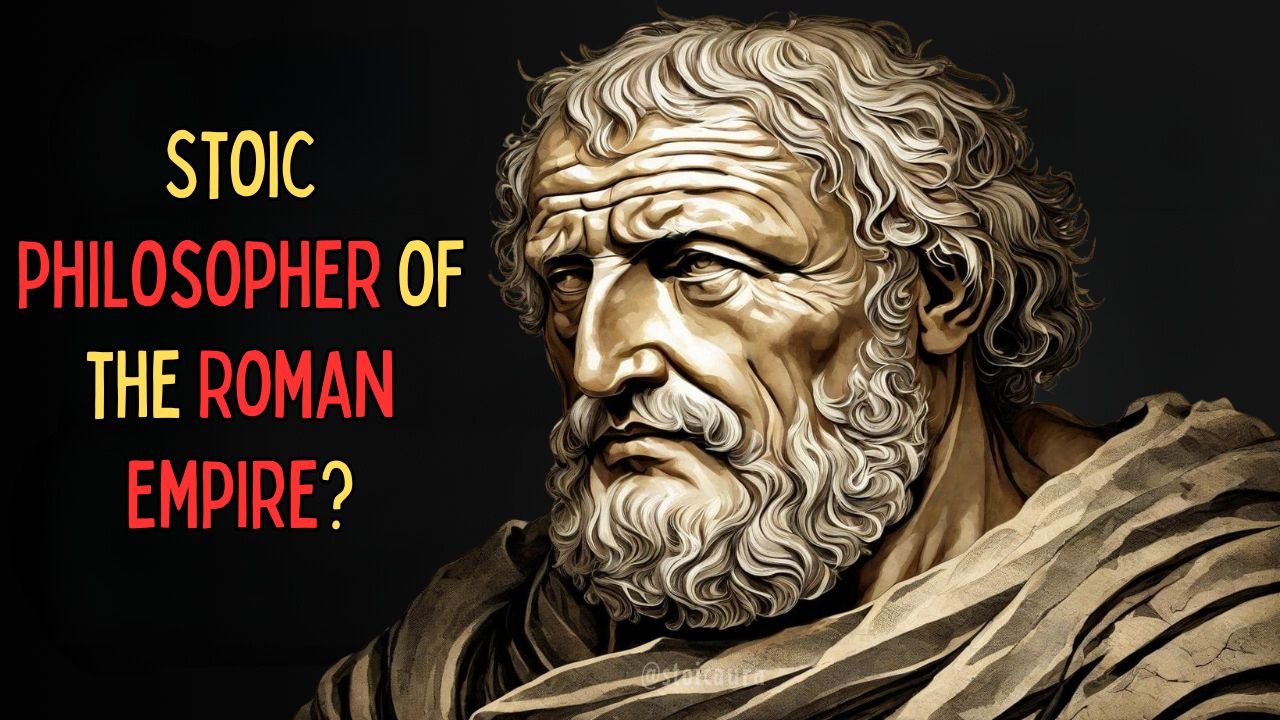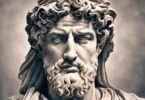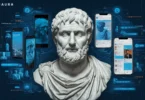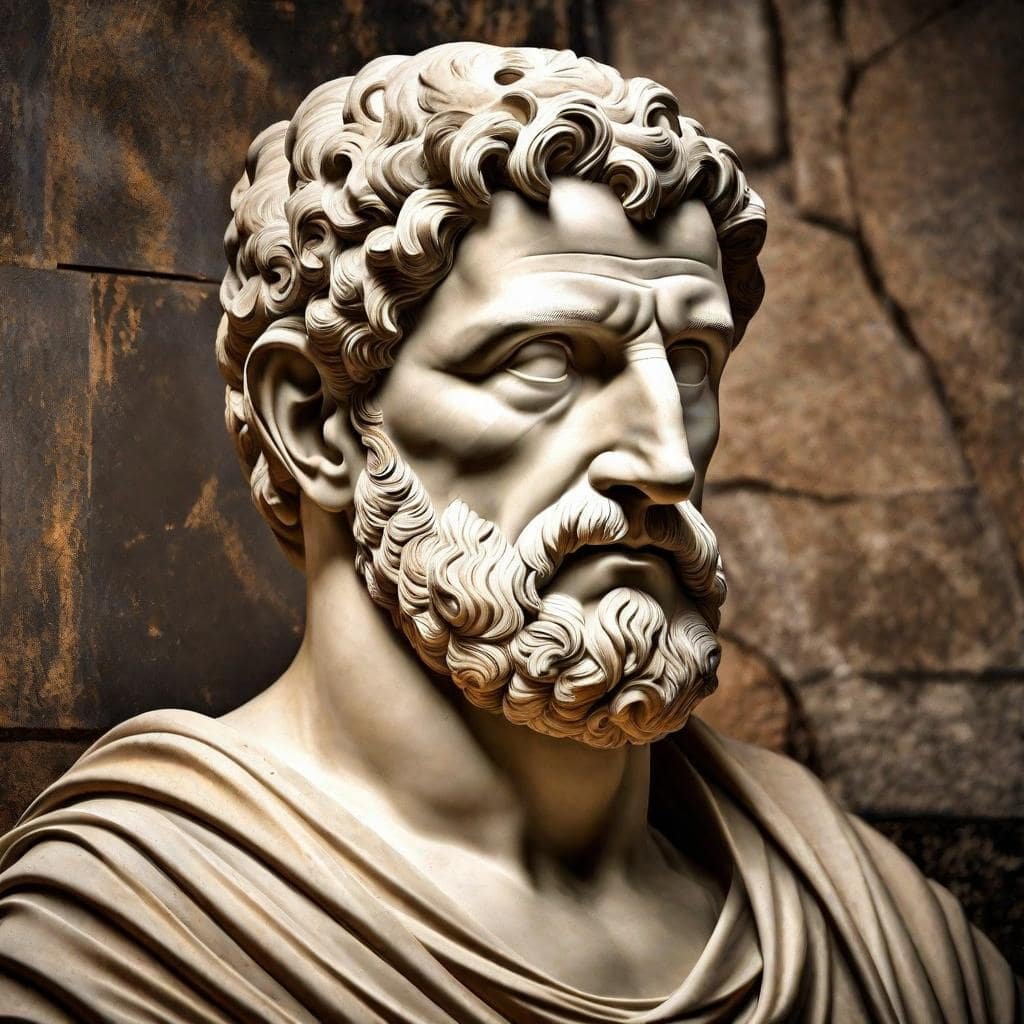
I. Introduction
Attention, fellow seekers of Stoic wisdom! Have you ever pondered the profound influence of Stoic philosophy within the Roman Empire? Amidst the annals of history lies a question that ignites curiosity: Who was the leading Stoic philosopher of the Roman Empire? Delving into this inquiry unravels a tapestry of intellect, resilience, and virtue. As we embark on this enlightening journey, we’ll navigate the corridors of ancient wisdom, exploring the lives and teachings of Stoic luminaries who shaped the ethos of their era. From the hallowed halls of Athens to the imperial courts of Rome, their insights resonate across time, offering solace and guidance in the face of life’s tribulations. Join us as we unravel the enigma of the leading Stoic philosopher of the Roman Empire, discovering pearls of wisdom to enrich our modern lives.
A. Setting the Scene
- Brief overview of Stoicism’s influence in the Roman Empire
Stoicism left an indelible mark on the Roman Empire, with its influence reverberating through various facets of society and governance. Central to this influence were the stoic Roman emperors, who embraced Stoic principles in their leadership and governance. Figures like Marcus Aurelius embodied the Stoic ethos, promoting virtues such as wisdom, courage, and resilience. These principles permeated Roman culture, guiding not only individual conduct but also shaping policies and institutions. Stoicism offered a philosophical framework that emphasized rationality and self-discipline, providing Romans with a moral compass in navigating the complexities of life. From literature to governance, Stoic philosophy played a pivotal role in shaping the collective mindset of the empire. Ultimately, Stoicism’s impact extended beyond philosophical discourse, becoming an integral aspect of Roman Empire philosophy and contributing to its stability and endurance over time.
- Importance of understanding the leading Stoic philosopher
Understanding the leading Stoic philosopher of the Roman Empire is crucial for grasping the essence of Stoic philosophy and its profound impact on society. Stoicism was not merely an abstract philosophical concept but a practical guide to living a virtuous and fulfilling life, especially in turbulent times. By delving into the teachings and writings of the stoic Roman emperors and other prominent Stoic thinkers, one gains insights into the core principles that shaped the moral and ethical fabric of the Roman Empire. Moreover, exploring the philosophy of Stoicism within the context of the Roman Empire offers valuable lessons on resilience, self-discipline, and moral integrity that remain relevant in modern times. Understanding the historical and philosophical underpinnings of Stoicism enables individuals to apply its principles to navigate challenges, cultivate inner peace, and lead a more meaningful existence.
B. Statement of Purpose
- Exploring the lives and teachings of prominent Stoic figures
Exploring the lives and teachings of prominent Stoic figures, including stoic Roman emperors, provides a fascinating journey into the heart of Stoic philosophy and its profound impact on the Roman Empire. Figures like Marcus Aurelius, Seneca, and Epictetus not only exemplified Stoic principles in their own lives but also left behind a rich legacy of writings and teachings that continue to inspire and guide individuals today. By studying their lives and works, we gain valuable insights into Stoic virtues such as resilience, self-discipline, and moral integrity, as well as practical strategies for navigating life’s challenges with wisdom and equanimity. Moreover, delving into the philosophical landscape of the Roman Empire allows us to appreciate the cultural and historical context in which Stoicism flourished, deepening our understanding of this timeless philosophy and its relevance to the human experience.
- Understanding their impact on Roman society and philosophy
Understanding the impact of stoic Roman emperors on Roman society and philosophy unveils a profound intertwining of leadership and philosophical thought within the Roman Empire. These emperors, such as Marcus Aurelius, wielded immense political power while embodying Stoic virtues like wisdom, temperance, and justice. Their influence extended beyond governance, shaping the moral fabric of Roman society and inspiring philosophical discourse. Stoicism, with its emphasis on rationality and virtue, provided a framework for individuals to navigate the complexities of life and society. The teachings of Stoic emperors resonated deeply with the Roman populace, fostering a culture of resilience, self-discipline, and civic responsibility. Moreover, their philosophical contributions laid the groundwork for subsequent thinkers and shaped the trajectory of Roman Empire philosophy, leaving an indelible mark on intellectual discourse and ethical norms for centuries to come.
C. Intriguing Question
- Posing the question: Who was the leading Stoic philosopher of the Roman Empire?
Delving into the annals of Roman Empire philosophy, one question stands out: Who was the leading Stoic philosopher of the era? Among the luminaries of Stoicism, stoic Roman emperors like Marcus Aurelius, Seneca, and Epictetus often take center stage. Each brought a unique perspective to Stoic philosophy, blending practical wisdom with profound insights into human nature. Marcus Aurelius, revered as the philosopher-king, grappled with existential questions in his “Meditations,” offering timeless reflections on virtue and resilience. Seneca, known for his philosophical treatises and letters, emphasized the importance of inner tranquility amid adversity. Epictetus, a former slave turned philosopher, focused on the power of personal agency and acceptance of fate. Their contributions not only enriched Stoic thought but also left an indelible mark on Roman Empire philosophy, inspiring generations to pursue wisdom, virtue, and a life well-lived.
- Creating anticipation for the exploration to follow
As we embark on our journey to uncover the leading Stoic philosopher of the Roman Empire, the path ahead is rich with intrigue and discovery. Through the lens of stoic Roman emperors and the profound wisdom they imparted, we’ll delve deep into the heart of Roman Empire philosophy. With each step, we’ll unravel the intricate tapestry of Stoic thought, exploring the profound impact these philosophers had on society and the enduring relevance of their teachings today. From the stoic musings of Marcus Aurelius to the philosophical insights of Seneca and Epictetus, we’ll navigate through the corridors of ancient wisdom, guided by their timeless principles of virtue, resilience, and inner peace. Join us as we embark on a quest to unlock the secrets of Stoicism and uncover the profound truths that lie at the intersection of philosophy and life.
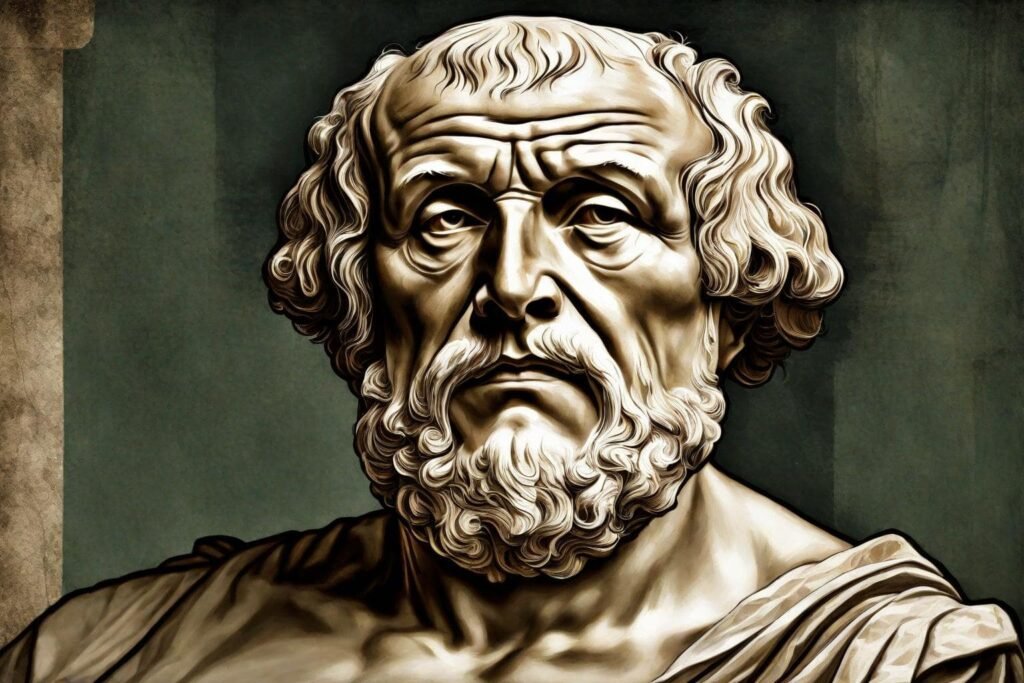
II. Exploration of Leading Stoic Philosophers
A. Seneca the Younger
- Background and life of Seneca
Seneca, a towering figure in Stoic philosophy, graced the annals of history with his profound insights and timeless wisdom. Born in 4 BC in Cordoba, Spain, Seneca’s life was intertwined with the tapestry of the Roman Empire’s grandeur and tumult. As a prominent statesman, orator, and philosopher, he navigated the corridors of power under the rule of stoic Roman emperors like Nero, offering counsel and guidance amid the political intrigues of the time. His philosophical treatises, including “Letters to Lucilius” and “On the Shortness of Life,” continue to resonate with readers seeking solace and wisdom in today’s tumultuous world. Seneca’s life exemplifies the essence of Roman Empire philosophy, blending practical wisdom with profound insights into the human condition. Through his enduring legacy, Seneca continues to inspire generations to embrace virtue, resilience, and inner peace in the face of life’s challenges.
- Key philosophical teachings and contributions
Seneca’s philosophical teachings stand as pillars of wisdom in the realm of Stoicism and Roman Empire philosophy. He espoused the virtues of self-discipline, resilience, and moral integrity, guiding individuals on a path toward inner peace and fulfillment. Through his renowned works, Seneca explored the concept of stoic Roman emperors as role models of virtue, emphasizing the importance of aligning one’s actions with reason and nature. His insights on the transient nature of life, as showcased in “On the Shortness of Life,” offer profound reflections on the human condition and the pursuit of happiness. Seneca’s emphasis on living in accordance with virtue and accepting the inevitability of change resonates deeply with readers seeking guidance in navigating life’s complexities. His enduring legacy continues to inspire individuals to cultivate inner strength and lead lives of purpose and virtue.
B. Epictetus
- Introduction to Epictetus and his background
Epictetus, a prominent figure in Roman Empire philosophy and Stoicism, left an indelible mark with his profound insights into the human condition. Born into slavery, his journey from bondage to philosophical mastery is nothing short of remarkable. Despite his humble origins, Epictetus rose to prominence as a Stoic teacher in Rome, where he attracted disciples from all walks of life, including stoic Roman emperors seeking guidance on governance and personal virtue. His teachings, recorded by his student Arrian in the “Discourses” and “Enchiridion,” emphasized the importance of mastering one’s thoughts and actions, advocating for inner freedom in the face of external circumstances. Epictetus’s philosophy resonates with modern readers seeking solace and guidance in navigating life’s challenges, offering timeless wisdom on resilience, virtue, and the pursuit of inner peace.
- Examination of his Stoic principles and their relevance
Epictetus’s Stoic principles continue to resonate profoundly in contemporary society, offering timeless wisdom on navigating life’s challenges. His teachings, deeply rooted in Roman Empire philosophy and Stoicism, emphasize the importance of maintaining inner tranquility and virtue amidst external turmoil. Epictetus believed that true freedom lies in mastering one’s own thoughts and attitudes, regardless of external circumstances. His emphasis on self-discipline, resilience, and ethical living provides invaluable guidance for individuals striving to lead meaningful and fulfilling lives. Moreover, Epictetus’s influence extended beyond his time, shaping the worldview of stoic Roman emperors and countless others seeking wisdom and guidance. Today, his teachings remain relevant as ever, offering practical insights into managing stress, overcoming adversity, and cultivating inner peace. By embracing Epictetus’s Stoic principles, individuals can navigate life’s complexities with clarity, purpose, and resilience, ultimately leading to a deeper sense of fulfillment and happiness.
C. Marcus Aurelius
- Introduction to Marcus Aurelius, the Stoic Roman Emperor
Meet Marcus Aurelius, a towering figure in history and the epitome of a stoic Roman emperor. As the ruler of the vast Roman Empire, Marcus Aurelius not only governed with wisdom and integrity but also embraced the profound teachings of Stoicism. His reign, characterized by ethical leadership and philosophical depth, exemplifies the fusion of Roman Empire philosophy with practical governance. Marcus Aurelius’s personal journal, known as “Meditations,” offers a glimpse into his inner thoughts and struggles, revealing his commitment to Stoic principles amidst the complexities of imperial rule. Through his writings, Marcus Aurelius shares timeless wisdom on resilience, virtue, and the pursuit of inner peace, inspiring generations to come. Today, his legacy as a philosopher-king continues to resonate, serving as a beacon of wisdom for those navigating life’s challenges with grace and fortitude. Marcus Aurelius stands as a testament to the enduring power of Stoic philosophy in shaping both personal character and societal leadership.
- Analysis of his Meditations and Stoic philosophy in governance
In his renowned work “Meditations,” Marcus Aurelius, the stoic Roman emperor, offers profound insights into the application of Roman Empire philosophy in governance. Through introspective reflections, Marcus Aurelius delves into the principles of Stoicism, advocating for the cultivation of virtue, resilience, and rationality in the face of adversity. His meditations serve as a guide for ethical leadership, emphasizing the importance of temperance, justice, and compassion in governance. Marcus Aurelius’s Stoic philosophy informed his decisions as a ruler, guiding him to prioritize the well-being of his subjects and the greater good of society. By aligning his actions with Stoic principles, Marcus Aurelius exemplified the ideal of a philosopher-king, whose wisdom and integrity shaped the course of history. Today, his Meditations continue to inspire leaders and individuals alike, offering timeless lessons on moral governance and the pursuit of excellence in all aspects of life.
D. Comparisons and Conclusions
- Contrasting the philosophies and impacts of Seneca, Epictetus, and Marcus Aurelius
Seneca, Epictetus, and Marcus Aurelius, though each a stoic Roman emperor, imparted unique philosophies and left distinct legacies within the realm of Roman Empire philosophy. Seneca, renowned for his practical wisdom and eloquent writings, emphasized the importance of virtue and inner tranquility in navigating life’s challenges. Epictetus, a former slave turned philosopher, focused on the power of personal agency and resilience, teaching that individuals have control over their own thoughts and actions. Marcus Aurelius, as both emperor and philosopher, epitomized Stoic principles in governance, advocating for justice, temperance, and ethical leadership. While Seneca’s emphasis was on practical wisdom, Epictetus prioritized personal discipline, and Marcus Aurelius exemplified Stoic philosophy in action. Together, their teachings offer a comprehensive understanding of Stoicism’s enduring relevance, guiding individuals to find strength, resilience, and moral clarity in the face of life’s uncertainties.
- Reflecting on their enduring influence on Stoicism and the Roman Empire
The stoic Roman emperors and philosophers Seneca, Epictetus, and Marcus Aurelius left an indelible mark on Roman Empire philosophy and Stoicism’s enduring legacy. Their teachings continue to resonate across centuries, offering timeless wisdom and practical guidance for navigating life’s challenges with resilience and virtue. Seneca’s emphasis on practical wisdom, Epictetus’s focus on personal agency, and Marcus Aurelius’s commitment to ethical leadership have shaped countless individuals’ understanding of Stoic principles. Their profound insights into human nature, ethics, and the pursuit of inner tranquility remain relevant in the modern world, inspiring people to cultivate resilience, virtue, and moral clarity. As pillars of Stoic philosophy and exemplars of Stoic virtues, Seneca, Epictetus, and Marcus Aurelius continue to inspire individuals worldwide to lead lives of purpose, integrity, and enduring happiness.
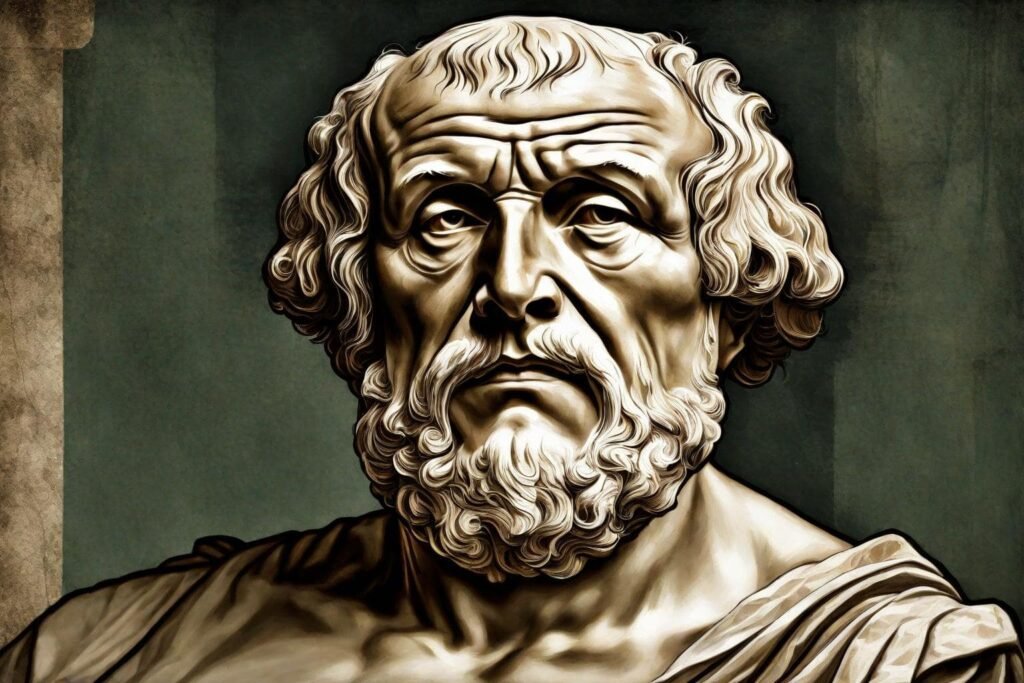
III. Conclusion
A. Recap of Key Points
- Summary of the lives and teachings of Seneca, Epictetus, and Marcus Aurelius
Seneca, Epictetus, and Marcus Aurelius, renowned stoic Roman emperors and philosophers, each contributed uniquely to Roman Empire philosophy and Stoic principles. Seneca, known for his pragmatic approach to philosophy, emphasized the importance of virtue and self-mastery in achieving inner peace. Epictetus, a former slave turned philosopher, focused on personal agency and resilience, teaching that true freedom lies in one’s ability to control their responses to external events. Marcus Aurelius, the revered philosopher-emperor, exemplified Stoic principles in governance, emphasizing duty, justice, and humility. Despite their diverse backgrounds and contexts, their teachings converge on the importance of virtue, resilience, and ethical living. Their enduring legacies continue to inspire individuals worldwide to cultivate inner strength, live with integrity, and embrace the Stoic principles of wisdom, courage, temperance, and justice in their daily lives.
- Highlighting their roles as leading Stoic philosophers of the Roman Empire
Their collective contributions not only shaped the Roman Empire philosophy but also influenced subsequent generations of thinkers and leaders. Seneca’s eloquent writings, Epictetus’s practical teachings, and Marcus Aurelius’s insightful reflections continue to inspire individuals worldwide to cultivate stoic virtues and navigate life’s challenges with wisdom and resilience. Their profound impact on stoicism and Roman Empire philosophy underscores the enduring relevance of their principles in fostering personal growth, ethical conduct, and inner peace. As we delve deeper into their lives and teachings, we gain valuable insights into the human condition and the timeless quest for meaning and fulfillment. Through their examples, we learn to embrace adversity with equanimity, cultivate virtues that lead to lasting happiness, and uphold the ideals of justice, integrity, and compassion in our lives.
B. Emphasis on Legacy
- Discussing the enduring impact of Stoicism on modern philosophy and life
The influence of stoic philosophy, spearheaded by notable figures like Seneca, Epictetus, and Marcus Aurelius, extends far beyond the boundaries of the ancient Roman Empire. Their teachings have left an indelible mark on modern thought, shaping various disciplines such as psychology, ethics, and personal development. In today’s fast-paced world, the timeless wisdom of stoicism offers invaluable guidance for navigating life’s complexities with grace and resilience. By embracing stoic principles, individuals can cultivate inner peace, fortitude, and a sense of purpose amidst adversity. Moreover, the emphasis on virtue ethics and rationality resonates with contemporary approaches to moral reasoning and decision-making. As people continue to explore the depths of stoicism, its relevance in promoting well-being and ethical conduct remains as potent as ever, serving as a guiding light for those seeking fulfillment and wisdom in the modern era.
- Reflecting on the relevance of Stoic principles in today’s world
In our fast-paced and often turbulent world, the timeless wisdom of stoic philosophy, championed by influential figures like Seneca, Epictetus, and Marcus Aurelius, offers invaluable insights for navigating life’s challenges. The stoic principles of resilience, virtue, and acceptance remain as relevant today as they were in the ancient Roman Empire. In an era marked by uncertainty and upheaval, the teachings of stoicism provide a steady anchor, guiding individuals towards inner peace and emotional well-being. By cultivating a stoic mindset, people can develop the strength to endure adversity with grace and the wisdom to focus on what truly matters in life. Moreover, the emphasis on rationality and self-discipline aligns with contemporary approaches to personal growth and leadership. As we reflect on the enduring relevance of stoic principles, it becomes clear that their profound insights continue to offer solace and guidance in the modern world.
C. Call to Action
- Encouraging readers to explore Stoic philosophy further
Delving into the rich tapestry of Stoic philosophy, shaped by the profound insights of Roman emperors and esteemed thinkers, promises a journey of enlightenment and self-discovery. By immersing oneself in the timeless wisdom of Stoicism, individuals can uncover invaluable tools for navigating life’s challenges with grace and resilience. Exploring the teachings of Stoic figures like Seneca, Epictetus, and Marcus Aurelius offers a gateway to profound insights into human nature and the art of living well. Whether seeking guidance on overcoming adversity, cultivating inner peace, or embracing virtue, the Stoic tradition offers a treasure trove of wisdom waiting to be explored. Through the study of Roman Empire philosophy, readers can gain a deeper understanding of themselves and the world around them, ultimately empowering them to lead more fulfilling and meaningful lives. Embrace the journey of Stoic exploration and unlock the secrets to lasting happiness and fulfillment.
- Inviting them to incorporate Stoic practices into their daily lives for personal growth and resilience
Embracing Stoic practices isn’t just an academic pursuit—it’s a transformative journey towards personal growth and resilience. By integrating the timeless wisdom of Roman emperors and Roman Empire philosophy into our daily lives, we can navigate the complexities of modern existence with greater clarity and strength. Incorporating Stoic principles, such as practicing mindfulness, cultivating gratitude, and embracing virtue, offers a roadmap to inner peace and fulfillment. Drawing inspiration from figures like Marcus Aurelius, Seneca, and Epictetus, we can learn to face adversity with courage, respond to challenges with wisdom, and find joy in the simple moments of life. Through consistent application of Stoic teachings, we cultivate resilience, fortitude, and a deeper understanding of ourselves and the world. So, let’s embark on this journey together, weaving Stoic practices into the fabric of our daily lives, and discover the profound transformation they bring.
FAQs
- What is Stoicism, and how did it originate?
Stoicism is a philosophical school that originated in ancient Greece, founded by Zeno of Citium around 300 BCE. It gained prominence in the Roman Empire and is characterized by its emphasis on virtue, resilience, and living in accordance with nature. - Who were some notable Stoic philosophers of the Roman Empire?
Prominent Stoic philosophers of the Roman Empire include Seneca, Epictetus, and Marcus Aurelius. They each contributed significant works and teachings that continue to influence modern philosophy and psychology. - How did Stoicism influence the Roman Empire?
Stoicism became highly influential in the Roman Empire, particularly among the intellectual and political elite. Its principles of virtue, self-discipline, and acceptance of fate resonated with many Romans, including emperors like Marcus Aurelius. - What are some key Stoic principles?
Stoic philosophy emphasizes the development of wisdom, courage, temperance, and justice. It teaches individuals to focus on what is within their control, accept external events with equanimity, and cultivate inner tranquility regardless of external circumstances. - How can Stoic philosophy benefit modern individuals?
Stoic philosophy offers practical wisdom for navigating life’s challenges, managing stress, and finding meaning and fulfillment. By adopting Stoic principles, individuals can cultivate resilience, improve their mental well-being, and lead more virtuous lives. - Are there any modern applications of Stoicism?
Yes, Stoicism has experienced a resurgence in popularity in recent years, with many individuals finding value in its teachings for personal growth, leadership development, and mental health. Stoic practices such as journaling, mindfulness, and gratitude exercises are widely used today. - Where can I learn more about Stoic philosophy?
There are numerous books, articles, and online resources available for those interested in learning more about Stoicism. Some recommended readings include “Meditations” by Marcus Aurelius, “Letters from a Stoic” by Seneca, and “Discourses” by Epictetus. Additionally, there are online communities and courses dedicated to studying and practicing Stoicism.

